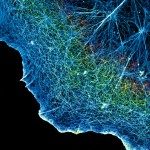Link to Pubmed [PMID] – 23801734
Brain 2013 Jul;136(Pt 7):2050-62
A large body of evidence points to a role of basal ganglia dysfunction in the pathophysiology of dystonia, but recent studies indicate that cerebellar dysfunction may also be involved. The cerebellum influences sensorimotor adaptation by modulating sensorimotor plasticity of the primary motor cortex. Motor cortex sensorimotor plasticity is maladaptive in patients with writer’s cramp. Here we examined whether putative cerebellar dysfunction in dystonia is linked to these patients’ maladaptive plasticity. To that end we compared the performances of patients and healthy control subjects in a reaching task involving a visuomotor conflict generated by imposing a random deviation (-40° to 40°) on the direction of movement of the mouse/cursor. Such a task is known to involve the cerebellum. We also compared, between patients and healthy control subjects, how the cerebellum modulates the extent and duration of an ongoing sensorimotor plasticity in the motor cortex. The cerebellar cortex was excited or inhibited by means of repeated transcranial magnetic stimulation before artificial sensorimotor plasticity was induced in the motor cortex by paired associative stimulation. Patients with writer’s cramp were slower than the healthy control subjects to reach the target and, after having repeatedly adapted their trajectories to the deviations, they were less efficient than the healthy control subjects to perform reaching movement without imposed deviation. It was interpreted as impaired washing-out abilities. In healthy subjects, cerebellar cortex excitation prevented the paired associative stimulation to induce a sensorimotor plasticity in the primary motor cortex, whereas cerebellar cortex inhibition led the paired associative stimulation to be more efficient in inducing the plasticity. In patients with writer’s cramp, cerebellar cortex excitation and inhibition were both ineffective in modulating sensorimotor plasticity. In patients with writer’s cramp, but not in healthy subjects, behavioural parameters reflecting their capacity for adapting to the rotation and for washing-out of an earlier adaptation predicted the efficacy of inhibitory cerebellar conditioning to influence sensorimotor plasticity: the better the online adaptation, the smaller the influence of cerebellar inhibitory stimulation on motor cortex plasticity. Altered cerebellar encoding of incoming afferent volleys may result in decoupling the motor component from the afferent information flow, and also in maladjusted sensorimotor calibration. The loss of cerebellar control over sensorimotor plasticity might also lead to building up an incorrect motor program to specific adaptation tasks such as writing.


